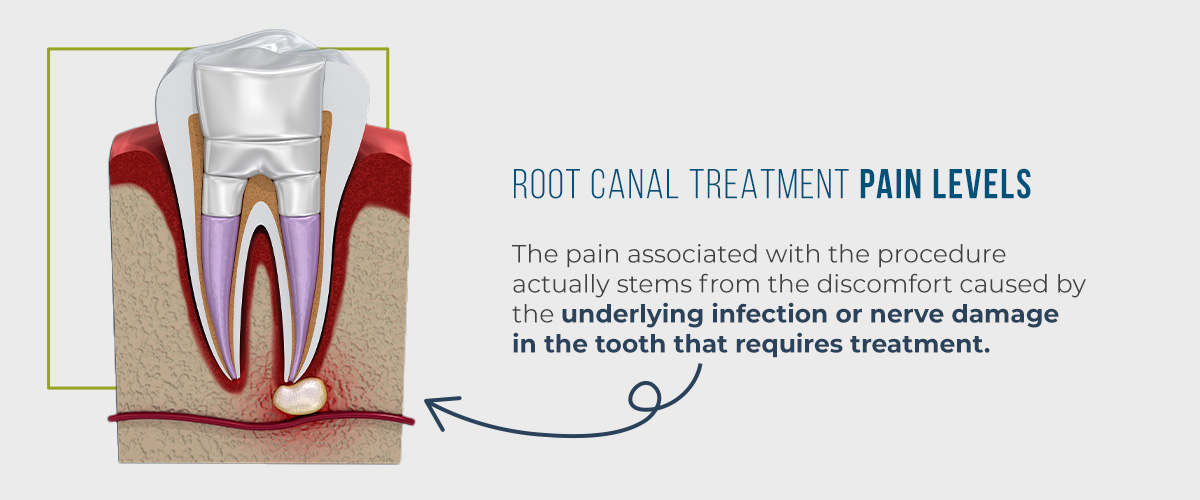Is a Root Canal Painful?
July 24, 2024 12:42 am

Is a Root Canal Painful?
Among the many myths about root canals, severe pain during and after the procedure is a leading misconception. Other myths insist that root canals can cause illness and that tooth extraction is a better solution. With modern innovations in dental technology and anesthesia, root canal procedures are hardly as painful as the myths suggest. The procedure has successfully saved millions of natural teeth from extraction or loss.
Unfortunately, the general notions surrounding root canals cause countless people to shy away from the treatment. If you think you might need treatment, but root canal pain myths keep you from the dentist, read on to find out what you can expect from this restorative dental procedure.
What Is a Root Canal?
Endodontic treatment, or a root canal, is a dental procedure that removes the soft pulp tissue from a tooth. The pulp is the innermost layer of a tooth, and removing this tissue can spare the tooth from decay.
The dentist will take an X-ray to determine the need for a root canal. During the procedure, the dentist will make an opening on top of the affected tooth to access the soft pulp tissue. They will then remove the infected pulp before filling the tooth with a rubber-like substance called gutta-percha. After that, the dentist will also fill the opening on top of the tooth.
During a follow-up appointment, the dentist may replace the initial filling with a permanent crown.
Root Canal Treatment Pain Levels

Contrary to the common belief, root canal pain levels are not severe. The pain associated with the procedure actually stems from the discomfort caused by the underlying infection or nerve damage in the tooth that requires treatment.
When a tooth needs a root canal, the soft innermost layer of pulp is infected, or the nerves within the pulp have been damaged. These symptoms can be unbearable, even more so when prolonged. Neglecting these symptoms for too long can lead to severe tooth decay or loss. Even though an infection may cause the pulp to die, which may stop the pain, the pulp necrosis can also lead to a dental abscess. An untreated abscess can have severe health consequences, as the infection can spread to other areas of the mouth, face and head.
When opting for a root canal, you will receive local anesthesia. Your dentist will make sure the anesthetic completely numbs the nerves surrounding the affected tooth before beginning the procedure. With the local anesthesia at work, you won’t feel any pain while the dentist works on the affected tooth.
Once the procedure is complete, you must rest for about an hour while the anesthesia wears off. As the anesthesia wears off, so will its numbing effects. You may experience mild to moderate sensitivity and swelling. However, the pain levels associated with root canal recovery are manageable with over-the-counter pain medications like ibuprofen and naproxen. After a few days, all sensitivity should subside. You can eat, brush and floss as usual during the few days of recovery.
Common Signs You Might Need a Root Canal
Root canal therapy is not something to put off. If you’re in pain, it’s best to receive treatment as soon as possible. Delaying treatment will only prolong your pain and increase the damage to your mouth. Untreated tooth decay will only get worse.
If you are experiencing any of these common warning signs, schedule an appointment with Henson Family Dental:
- Throbbing pain localized in one tooth
- New and sudden onset of oral pain
- Pain that wakes you up in the middle of the night
- Sensitivity to hot or cold temperatures
- Sores on your gums
- Swollen gums
Preserve Your Teeth at Henson Family Dental
Our team can perform root canal therapy at Henson Family Dental in Temple Terrace, Florida. If you’re experiencing tooth pain, contact us today to let us know your concerns! We’ll schedule an exam to determine what’s happening so we can create a personalized treatment plan.

